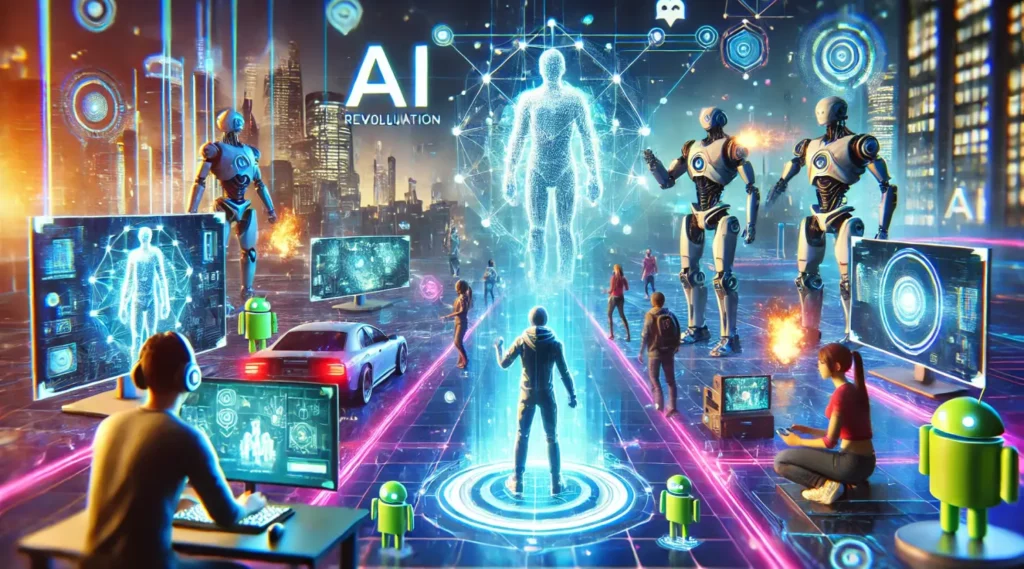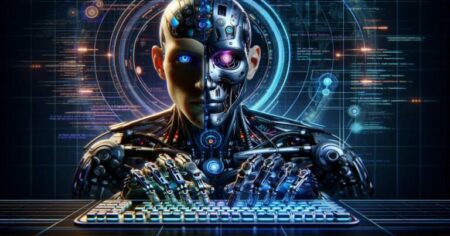Introduction
Imagine stepping into a virtual world where every interaction, every challenge, and every opportunity is tailored to your unique playstyle. This is no longer a distant dream—artificial intelligence (AI) is making it possible. From dynamic NPCs to fully adaptive environments, AI is reshaping the gaming industry, pushing the boundaries of creativity and immersion.
As we move into an era dominated by advanced technology, let’s explore how AI is redefining the gaming experience and what the future holds for both developers and players.
A Brief History of AI in Gaming
AI has been a silent yet powerful force in gaming since its inception. Early implementations were simple, like the predictable ghost behaviors in Pac-Man. Over time, it evolved into more complex systems, such as the realistic AI-controlled opponents in Chessmaster and the lifelike NPCs in The Elder Scrolls series.
One of the first breakthroughs came with procedural generation, where games like Diablo created randomized dungeons. AI began influencing not just gameplay but the very structure of the game world. This foundation set the stage for the revolutionary applications we see today.
Modern Applications of AI in Gaming
1. Intelligent NPC Behavior
Modern games use AI to create NPCs that can adapt to player actions. For instance, in The Last of Us Part II, enemies communicate and strategize, reacting to your every move. This level of realism not only enhances immersion but also increases the challenge and replayability of games.
2. Procedural Content Generation
AI algorithms now allow developers to create massive, detailed worlds without manually designing every element. Games like No Man’s Sky use AI to generate billions of unique planets, each with its own ecosystems and challenges.
3. Personalized Gaming Experiences
AI analyzes player data to adapt gameplay. For instance, Left 4 Dead’s “AI Director” dynamically adjusts difficulty based on how well players perform, ensuring an engaging experience for everyone.
4. Improved Graphics and Realism
AI-driven tools such as NVIDIA’s DLSS (Deep Learning Super Sampling) optimize graphics performance, making games look stunning even on mid-tier hardware.
The Future of AI in Gaming
1. Fully Autonomous Game Worlds
Future games could feature worlds that evolve independently of human input. Imagine a city in a game where citizens live out their lives, forming relationships and reacting to events without pre-written scripts.
2. Natural Language Processing (NLP)
AI advancements in NLP could allow players to have real conversations with NPCs. Instead of selecting pre-written dialogue, you could type or speak naturally, and NPCs would respond intelligently.
3. Seamless Integration with VR
Virtual reality will benefit immensely from AI. Environments that change based on your reactions and realistic AI opponents will make VR experiences more immersive than ever before.
4. AI-Driven Storytelling
Future games may use AI to craft stories on-the-fly, responding to player decisions in real-time. This would create truly unique experiences for every player.
Challenges and Ethical Considerations
With great power comes great responsibility. AI in gaming also brings challenges. Over-reliance on AI can lead to privacy concerns, as collecting player data is often necessary to personalize experiences. Additionally, ensuring AI behaves ethically in multiplayer environments is crucial to maintaining fair gameplay.
Conclusion
AI is not just a tool—it’s a game-changer. As developers continue to push the boundaries of what’s possible, players can look forward to a future where games are more immersive, dynamic, and personalized than ever before. Whether it’s NPCs that think like humans, worlds that adapt to your choices, or entirely new genres enabled by AI, the possibilities are endless.
The next era of gaming is here, and artificial intelligence is leading the charge. Are you ready to level up?







